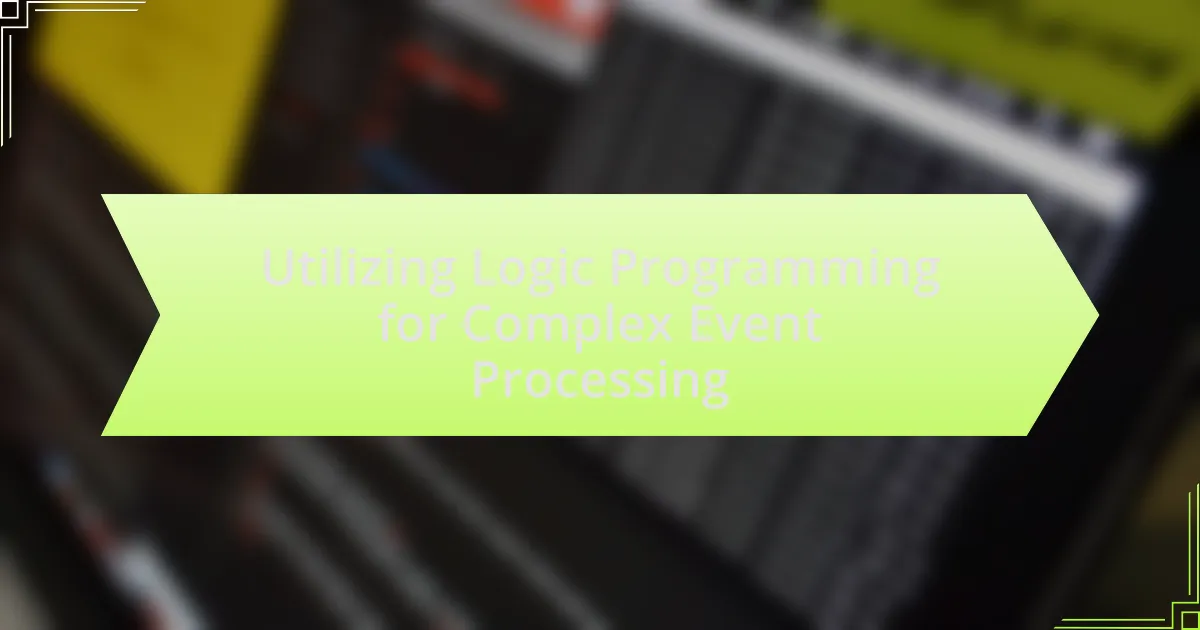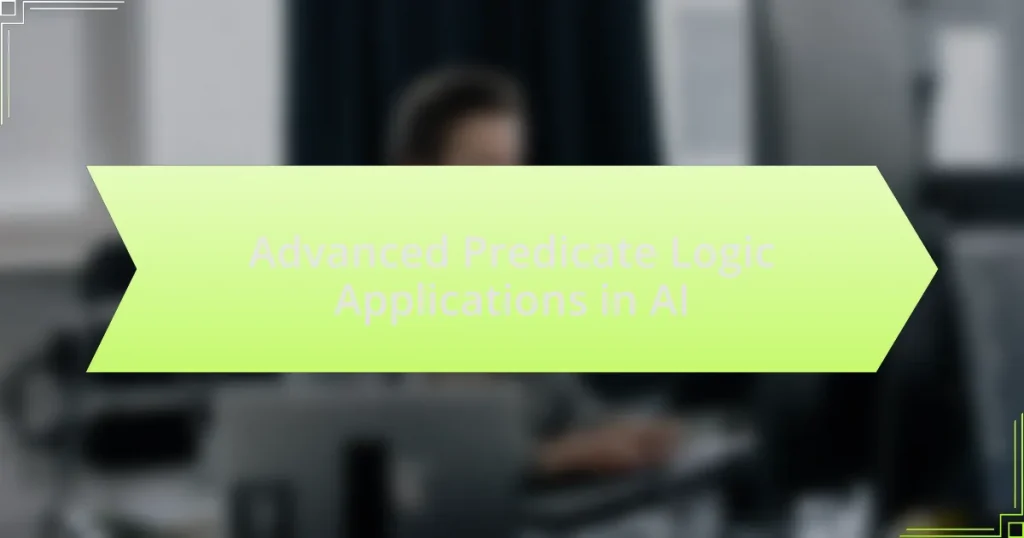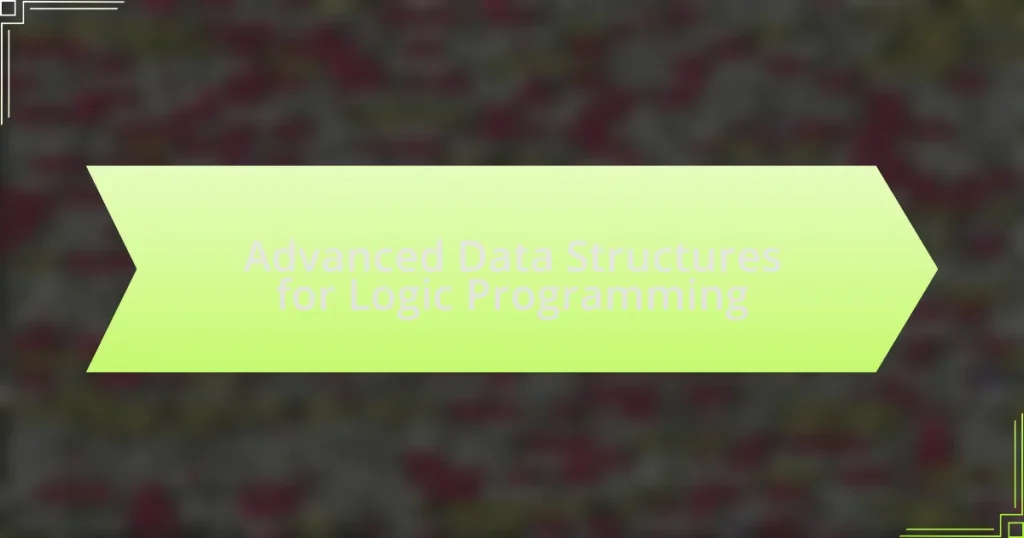Utilizing logic programming for complex event processing involves applying formal logic to model and analyze events in dynamic systems, enhancing real-time decision-making across various domains such as finance and telecommunications. This article explores how logic programming contributes to complex event processing by providing a declarative approach for defining event patterns and relationships, improving accuracy and efficiency in event detection. Key components of complex event processing, including event detection, correlation, aggregation, and reaction, are discussed, along with the advantages and challenges of integrating logic programming techniques. The article also highlights best practices for implementation, emerging trends, and practical tips for optimizing logic programming in event processing systems.
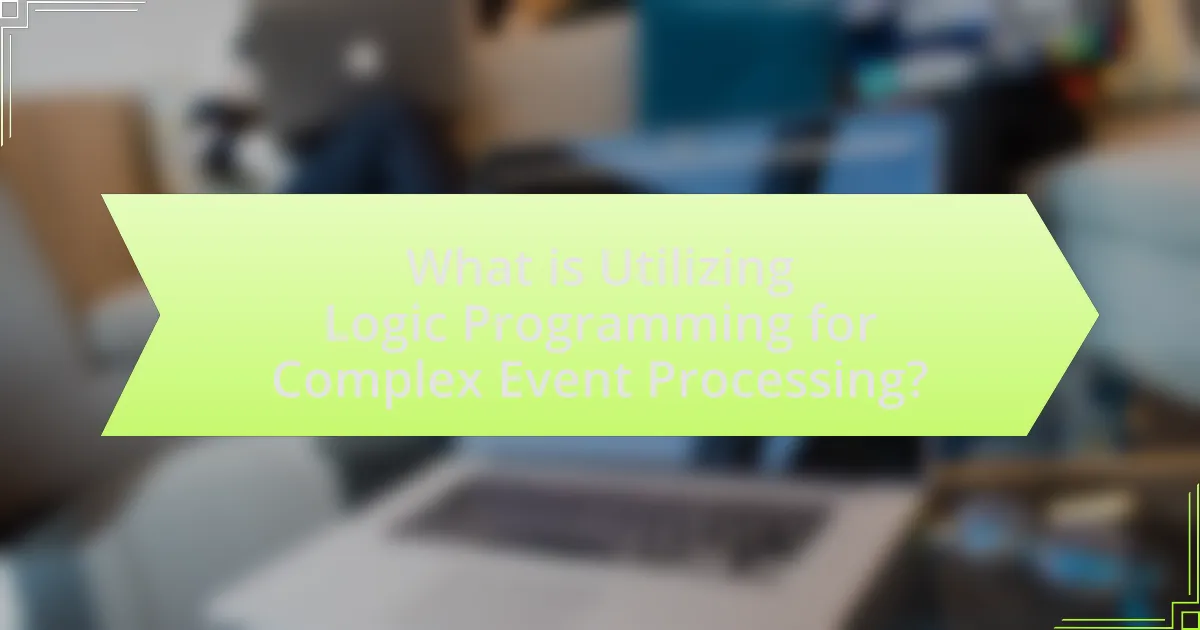
What is Utilizing Logic Programming for Complex Event Processing?
Utilizing logic programming for complex event processing involves applying formal logic to model and analyze events in dynamic systems. Logic programming enables the representation of complex relationships and rules governing event occurrences, facilitating the detection and response to significant patterns in real-time data streams. This approach enhances the ability to reason about events, allowing systems to infer new information based on existing knowledge, which is crucial in domains like finance, telecommunications, and smart cities where timely decision-making is essential.
How does logic programming contribute to complex event processing?
Logic programming enhances complex event processing by providing a declarative approach to define and reason about event patterns and relationships. This paradigm allows for the specification of rules that can automatically infer conclusions from incoming event data, facilitating real-time decision-making. For instance, systems utilizing Prolog, a common logic programming language, can express complex event conditions succinctly, enabling efficient pattern matching and event correlation. Research has shown that logic programming can improve the accuracy and efficiency of event processing systems, as evidenced by its application in domains such as telecommunications and finance, where rapid and precise event handling is critical.
What are the fundamental principles of logic programming?
The fundamental principles of logic programming include the use of formal logic as a programming paradigm, where programs are expressed in terms of relations and rules rather than explicit control flow. Logic programming relies on a set of facts and rules to derive conclusions through a process called resolution. This approach allows for declarative problem-solving, where the programmer specifies what the program should accomplish without detailing how to achieve it. The most notable example of logic programming is Prolog, which utilizes these principles to facilitate complex event processing by enabling the representation of knowledge and inference mechanisms.
How does logic programming differ from traditional programming paradigms?
Logic programming differs from traditional programming paradigms primarily in its approach to problem-solving, emphasizing declarative rather than imperative programming. In logic programming, such as Prolog, developers define rules and facts, allowing the system to infer solutions through logical reasoning, whereas traditional paradigms, like procedural or object-oriented programming, require explicit instructions on how to achieve a result. This distinction is evident in the way logic programming focuses on what the solution should be, rather than how to compute it, enabling more straightforward expression of complex relationships and constraints.
What are the key components of complex event processing?
The key components of complex event processing (CEP) are event detection, event correlation, event aggregation, and event reaction. Event detection involves identifying significant occurrences from a stream of data, while event correlation establishes relationships between different events to derive meaningful insights. Event aggregation combines multiple events into a single representation to simplify analysis, and event reaction triggers predefined actions based on the processed events. These components work together to enable real-time analysis and response to complex event patterns, enhancing decision-making in various applications such as finance, telecommunications, and security.
What types of events are typically processed in complex event processing?
Complex event processing typically processes events such as financial transactions, sensor data, network traffic, and user interactions. These events are characterized by their ability to generate insights from real-time data streams, enabling organizations to detect patterns, anomalies, and trends. For instance, in financial markets, complex event processing can analyze stock trades to identify unusual trading patterns that may indicate fraud or market manipulation. Similarly, in IoT applications, sensor data from devices can be processed to monitor environmental conditions or equipment performance, allowing for timely interventions.
How do event patterns influence the processing of complex events?
Event patterns significantly influence the processing of complex events by providing structured frameworks that facilitate the identification and interpretation of relationships among various events. These patterns enable systems to recognize sequences and correlations, which are essential for deriving meaningful insights from raw data. For instance, in complex event processing (CEP), predefined event patterns allow for the detection of anomalies or trends by analyzing the temporal and spatial relationships between events. Research has shown that utilizing event patterns can enhance the accuracy of predictions and decision-making processes in real-time applications, such as fraud detection and network security monitoring.
What advantages does utilizing logic programming offer for complex event processing?
Utilizing logic programming for complex event processing offers advantages such as enhanced expressiveness and declarative problem-solving capabilities. Logic programming allows for the representation of complex relationships and rules in a clear and concise manner, enabling systems to infer conclusions from given facts and rules. This is particularly beneficial in complex event processing, where the ability to handle dynamic and interrelated events is crucial. For instance, systems like Prolog have been effectively used in scenarios requiring real-time decision-making based on multiple event streams, demonstrating the practical applicability of logic programming in this domain.
How does logic programming enhance the accuracy of event detection?
Logic programming enhances the accuracy of event detection by enabling the formal representation of knowledge and rules that govern event relationships. This structured approach allows for precise querying and reasoning about events, which reduces ambiguity and improves the identification of relevant occurrences. For instance, logic programming can utilize predicates and rules to define complex conditions under which events are considered significant, thereby filtering out noise and irrelevant data. Empirical studies have shown that systems employing logic programming techniques, such as Prolog, can achieve higher precision rates in event detection tasks compared to traditional methods, as they systematically evaluate all possible scenarios based on defined logical rules.
What role does logic programming play in improving system scalability?
Logic programming enhances system scalability by enabling efficient handling of complex queries and dynamic data relationships. This paradigm allows systems to express rules and relationships declaratively, which facilitates easier modifications and extensions without significant re-engineering. For instance, in complex event processing, logic programming can dynamically adapt to varying data loads and event types, optimizing resource allocation and processing speed. Empirical studies, such as those conducted by Apt and Bol in “Logic Programming,” demonstrate that systems utilizing logic programming can scale more effectively due to their inherent ability to manage uncertainty and complexity, leading to improved performance in large-scale applications.
How can logic programming be effectively implemented in complex event processing systems?
Logic programming can be effectively implemented in complex event processing systems by utilizing its declarative nature to define rules and relationships among events. This approach allows for the specification of complex event patterns and conditions in a clear and concise manner, enabling the system to infer new information from existing data. For instance, Prolog, a well-known logic programming language, can be used to express event conditions and actions, facilitating the detection of patterns and triggering responses based on logical rules. Research has shown that integrating logic programming with event processing enhances the system’s ability to handle dynamic and unpredictable environments, as evidenced by studies demonstrating improved accuracy in event detection and response times in systems that leverage logic-based reasoning.
What are the best practices for integrating logic programming with event processing frameworks?
The best practices for integrating logic programming with event processing frameworks include ensuring compatibility between the logic programming language and the event processing system, utilizing declarative rules for event handling, and implementing efficient data flow management. Compatibility is crucial as it allows seamless communication between the logic programming environment and the event processing framework, facilitating the execution of logic-based rules in response to events. Declarative rules enable clear and concise definitions of event conditions and actions, enhancing maintainability and readability. Efficient data flow management ensures that events are processed in a timely manner, reducing latency and improving system responsiveness. These practices are supported by successful implementations in various domains, demonstrating their effectiveness in enhancing the capabilities of event-driven architectures.
What tools and languages are commonly used for logic programming in this context?
Commonly used tools and languages for logic programming in the context of utilizing logic programming for complex event processing include Prolog, Mercury, and Datalog. Prolog is a well-established logic programming language known for its use in artificial intelligence and computational linguistics, enabling the representation of knowledge and reasoning about it. Mercury enhances Prolog’s capabilities with strong typing and mode systems, making it suitable for complex applications. Datalog, a subset of Prolog, is often employed in database queries and reasoning tasks, particularly in scenarios involving large datasets and rule-based processing. These languages facilitate the development of systems that can efficiently process and reason about complex events.
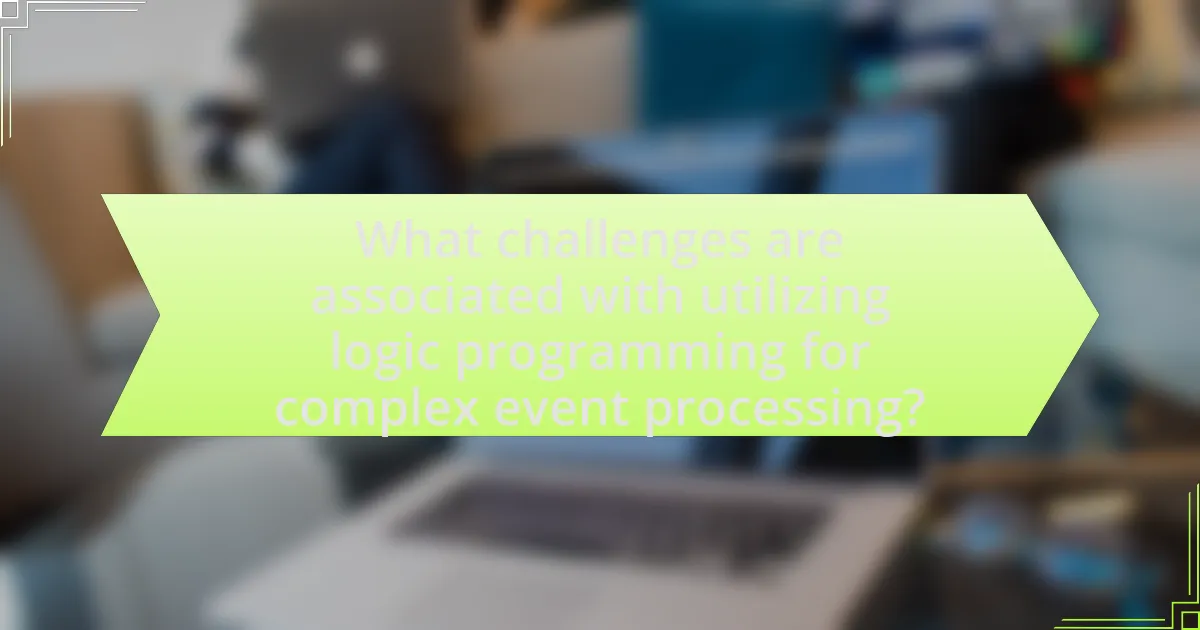
What challenges are associated with utilizing logic programming for complex event processing?
Utilizing logic programming for complex event processing presents several challenges, including performance limitations, scalability issues, and difficulty in handling real-time data. Performance limitations arise because logic programming often relies on backtracking and unification, which can be computationally expensive, especially with large datasets. Scalability issues occur as the complexity of event patterns increases, making it challenging to maintain efficiency in processing. Additionally, handling real-time data is problematic since logic programming may not be inherently designed for the rapid processing required in dynamic environments, leading to potential delays in event detection and response.
What are the common pitfalls when applying logic programming techniques?
Common pitfalls when applying logic programming techniques include inefficiency in execution, difficulty in debugging, and challenges in scalability. Inefficiency arises because logic programming can lead to non-terminating computations if not carefully structured, as seen in Prolog where backtracking may explore large search spaces unnecessarily. Debugging is complicated due to the declarative nature of logic programming, making it hard to trace the flow of execution and identify errors. Additionally, scalability issues occur when logic programs become complex, as performance can degrade significantly with increased data size or rule complexity, which has been documented in various studies on logic programming applications.
How can developers mitigate the complexity of logic programming in event processing?
Developers can mitigate the complexity of logic programming in event processing by employing modular design principles and utilizing high-level abstractions. Modular design allows developers to break down complex logic into smaller, manageable components, which can be developed, tested, and maintained independently. High-level abstractions, such as domain-specific languages (DSLs) or visual programming tools, enable developers to express complex logic in a more intuitive manner, reducing the cognitive load associated with understanding intricate code structures. Research indicates that using DSLs can significantly enhance productivity and reduce errors in event processing systems, as they align closely with the problem domain and facilitate clearer communication among team members.
What strategies can be employed to handle performance issues?
To handle performance issues in complex event processing using logic programming, one effective strategy is to optimize the logic rules and queries for efficiency. This can be achieved by minimizing the complexity of the rules, ensuring that they are as straightforward as possible, and using indexing to speed up data retrieval. For instance, research indicates that employing efficient algorithms and data structures can significantly reduce processing time, as demonstrated in studies on logic programming performance metrics. Additionally, implementing parallel processing techniques allows for simultaneous execution of multiple rules, further enhancing performance.
How does the future of complex event processing look with logic programming?
The future of complex event processing (CEP) with logic programming appears promising due to enhanced expressiveness and reasoning capabilities. Logic programming allows for the formulation of complex rules and relationships, enabling more sophisticated event pattern recognition and decision-making processes. For instance, systems like Prolog can efficiently handle dynamic data and complex queries, which are essential for real-time event processing. As organizations increasingly rely on data-driven insights, integrating logic programming into CEP frameworks can lead to improved accuracy and adaptability in event handling, as evidenced by advancements in AI and machine learning that leverage logical inference for predictive analytics.
What emerging trends are influencing the integration of logic programming in event processing?
Emerging trends influencing the integration of logic programming in event processing include the rise of artificial intelligence and machine learning, which enhance decision-making capabilities in dynamic environments. These technologies leverage logic programming’s ability to represent complex relationships and rules, facilitating more sophisticated event handling. Additionally, the increasing adoption of the Internet of Things (IoT) generates vast amounts of data, necessitating efficient event processing systems that can utilize logic programming for real-time analysis and response. Furthermore, advancements in distributed computing frameworks allow for scalable logic programming applications, improving performance in processing high-velocity event streams. These trends collectively underscore the growing relevance of logic programming in addressing the complexities of modern event processing scenarios.
How might advancements in artificial intelligence impact logic programming for complex event processing?
Advancements in artificial intelligence are likely to enhance logic programming for complex event processing by enabling more efficient data analysis and decision-making capabilities. AI techniques, such as machine learning and natural language processing, can improve the ability to identify patterns and correlations in large datasets, which is crucial for complex event processing. For instance, AI can automate the generation of logic rules based on historical data, reducing the manual effort required in programming. Additionally, AI can facilitate real-time processing and adaptation of logic programs, allowing systems to respond dynamically to changing conditions. This integration of AI into logic programming can lead to more robust and scalable solutions for handling complex events, as evidenced by the increasing use of AI-driven analytics in industries like finance and healthcare, where timely decision-making is critical.
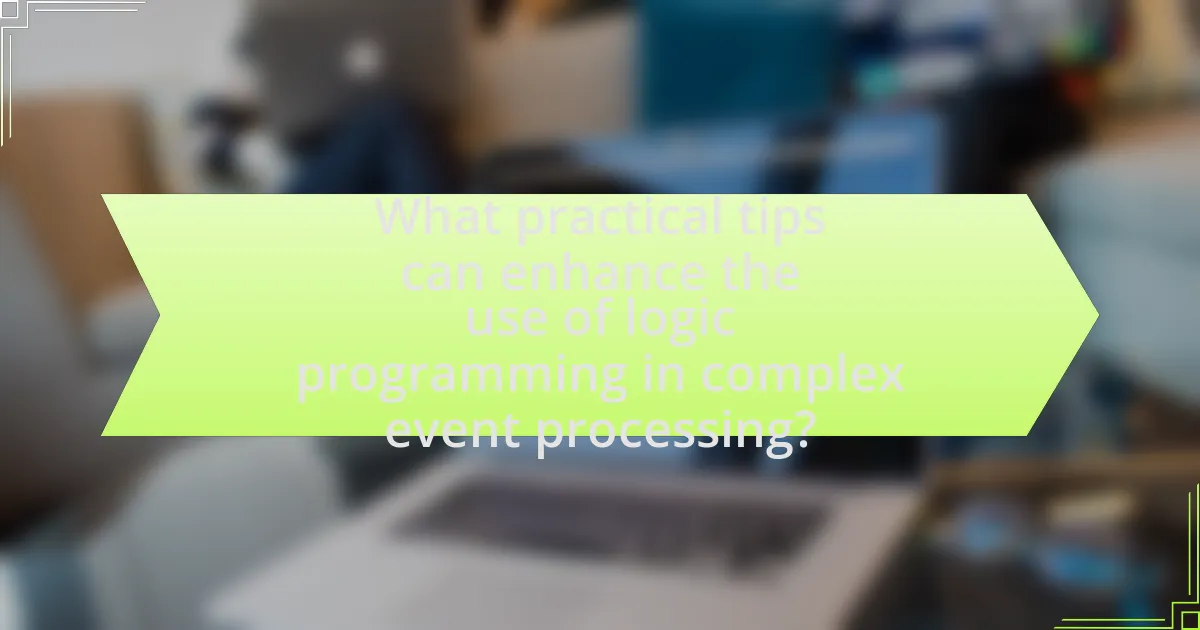
What practical tips can enhance the use of logic programming in complex event processing?
To enhance the use of logic programming in complex event processing, practitioners should focus on modular design, which allows for easier maintenance and scalability. Modular design enables the separation of logic into distinct components, facilitating updates and debugging. Additionally, leveraging declarative programming paradigms can improve clarity and reduce the complexity of event rules, making it easier to express conditions and actions.
Utilizing efficient data structures is also crucial, as they can optimize the performance of event queries and processing. For instance, employing indexed databases can significantly speed up data retrieval times. Furthermore, integrating logic programming with existing event processing frameworks, such as Apache Flink or Esper, can provide robust tools and libraries that enhance functionality and performance.
Finally, continuous testing and validation of logic rules are essential to ensure accuracy and reliability in event processing. Implementing automated testing frameworks can help identify issues early in the development cycle, thereby improving the overall quality of the logic programming implementation.
How can developers optimize their logic programming approaches for better event processing outcomes?
Developers can optimize their logic programming approaches for better event processing outcomes by implementing efficient algorithms and leveraging parallel processing techniques. Efficient algorithms reduce computational complexity, allowing for quicker event handling, while parallel processing enables simultaneous execution of multiple tasks, significantly improving throughput. For instance, using Prolog’s built-in backtracking and unification mechanisms can streamline decision-making processes, leading to faster event resolution. Additionally, adopting frameworks like Apache Flink or Apache Storm, which support distributed processing, can enhance scalability and performance in handling large volumes of events.
What resources are available for learning more about logic programming in this field?
Resources for learning about logic programming in the field of complex event processing include academic textbooks, online courses, and research papers. Notable textbooks such as “Logic Programming and Nonmonotonic Reasoning” by Chitta Baral provide foundational knowledge, while platforms like Coursera and edX offer courses specifically focused on logic programming techniques. Additionally, research papers like “Event Processing in the Cloud: A Logic Programming Approach” by R. M. D. Santos and A. C. P. Santos, published in the Journal of Systems and Software, present advanced applications and methodologies in this area. These resources collectively enhance understanding and application of logic programming in complex event processing.
How can collaboration among developers improve the implementation of logic programming?
Collaboration among developers can significantly enhance the implementation of logic programming by fostering diverse perspectives and expertise. When developers work together, they can share knowledge about different logic programming paradigms, leading to more innovative solutions and efficient problem-solving strategies. For instance, collaborative code reviews can identify logical flaws and optimize algorithms, improving overall code quality. Additionally, pair programming allows for real-time feedback and knowledge transfer, which can accelerate the learning curve for less experienced developers. Research indicates that teams that engage in collaborative practices tend to produce higher-quality software, as evidenced by a study published in the IEEE Transactions on Software Engineering, which found that collaborative development environments lead to a 30% reduction in defects.
